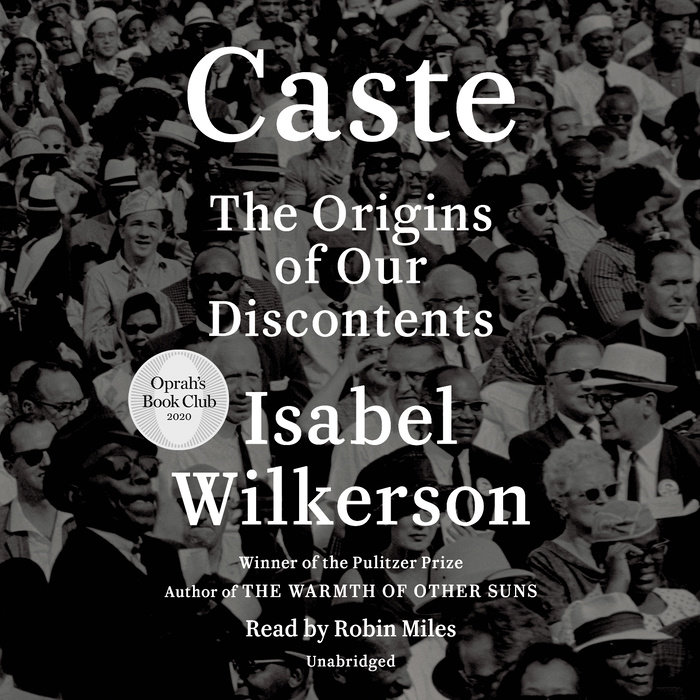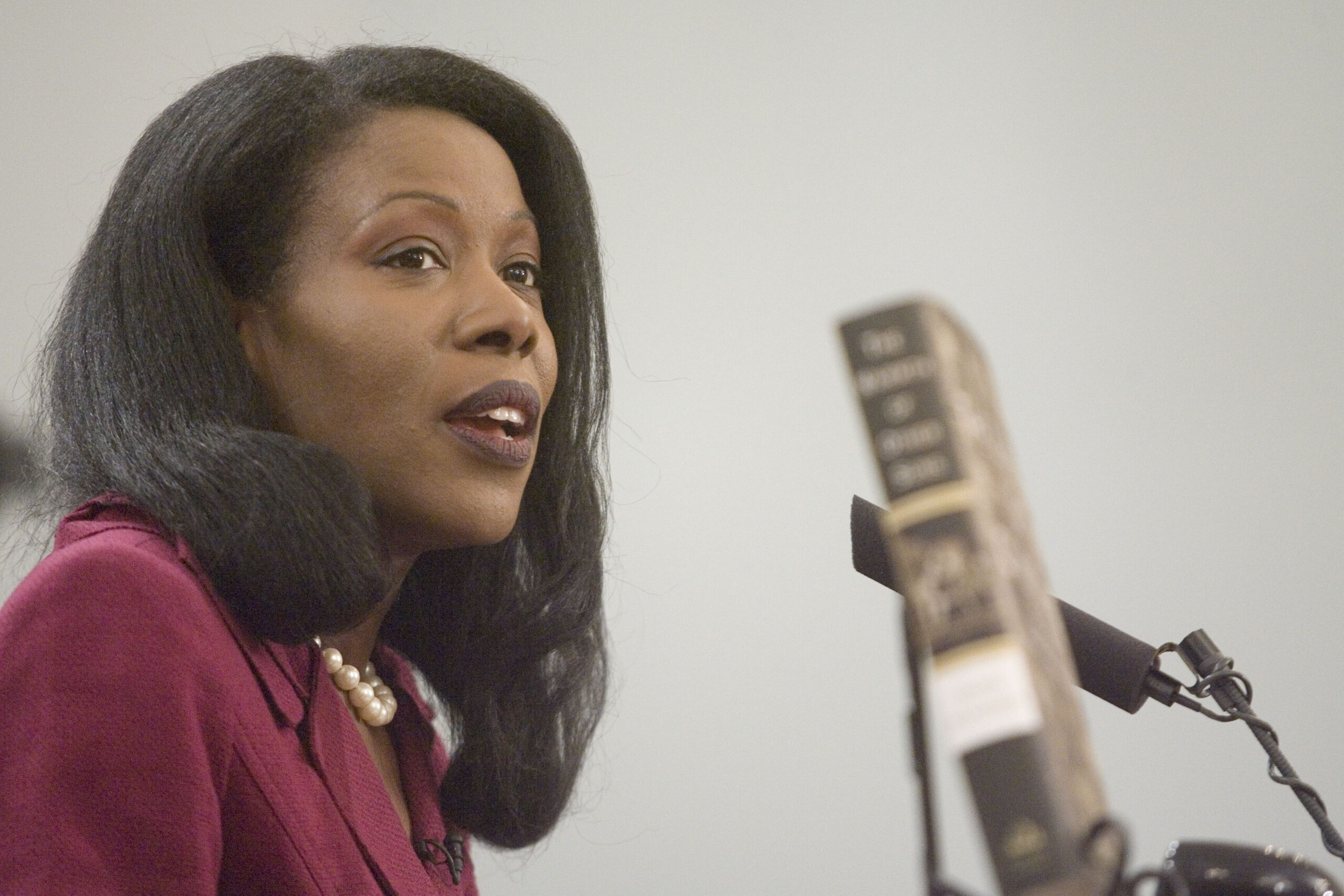Caste Audiobook

Isabel Wilkerson Caste Audiobook 🎧 The Origins of Our Discontents
The bestselling author of The Warmth of Other Suns examines the unspoken caste system that has shaped America and demonstrates how our lives are still defined by a hierarchy of human divisions today.
TIME NAMED IT THE #1 NONFICTION BOOK OF THE YEAR, ONE OF THE TEN BEST BOOKS OF THE YEAR BY PEOPLE, THE WASHINGTON POST, AND PUBLISHERS WEEKLY, AND ONE OF THE BEST BOOKS OF THE YEAR BY THE NEW YORK TIMES BOOK REVIEW • Fortune • Smithsonian Magazine • Marie Claire • Town & Country • Slate • Library Journal • Kirkus Reviews • LibraryReads • PopMatters
• Finalist for the National Book Critics Circle Award • Dayton Literary Peace Prize • PEN/John Kenneth Galbraith Award for Nonfiction Finalist • PEN/Jean Stein Book Award Longlist
«As we go about our daily lives, caste is the wordless usher in a darkened theater, guiding us to our assigned seats for a performance, flashlight cast down in the aisles.» The caste system is not based on feelings or morals. It all comes down to power—which groups have it and which do not.»
In this brilliant book, Isabel Wilkerson paints a masterful portrait of an unseen phenomenon in America, exploring how a hidden caste system has shaped America today and throughout its history, a rigid hierarchy of human rankings, through an immersive, deeply researched narrative, and stories about real people.
A powerful caste system influences people’s lives and behavior, as well as the fate of the nation, independent of race, class, or other factors. Wilkerson explores eight pillars that underpin caste systems across civilizations, including a divine, will, bloodlines, stigma, and more, by connecting the caste systems of America, India, and Nazi Germany. She demonstrates the insidious undertow of caste through riveting stories about people such as Martin Luther King, Jr., baseball’s Satchel Paige, a single father and his toddler son, Wilkerson herself, and many others. She explains why the cruel logic of caste requires that there be a bottom rung for those in the middle to measure themselves against; she writes about the surprising health costs of caste, in depression and life expectancy, and the effects of this hierarchy on our culture and politics. Finally, she suggests ways for America to move beyond the artificial and destructive divisions of humankind, toward hope in our shared humanity.
Caste: The Origins of Our Discontents, a beautifully written, original, and revealing story of people and history, is a reexamination of what lies beneath the surface of ordinary lives and of American life today.
#Caste #Casteaudiobook #Isabel Wilkerson
Isabel Wilkerson Bio

Isabel Wilkerson, one of the country’s most prominent reporters, first gained national attention in 1994, when she became the first African-American woman to win a Pulitzer Prize for journalism. During her time at the New York Times, she developed her own distinct style of narrative reporting, which necessitates an unusual amount of empathy and close attention to detail.
Isabel Wilkerson was born in 1961 in Washington, DC. Her parents, both Southerners, had stayed in Washington after meeting at Howard University, one of the city’s most prestigious institutions. Their journey north would later inspire Wilkerson to begin work on a narrative history of the millions of other African Americans who left the South between 1900 and the end of the civil-rights era. Wilkerson stated in the Emory Report in 2006 to Kim Urquhart, «It was something in my history that I had taken for granted, but if my parents had not been participants in this movement, I wouldn’t be here today.»
Wilkerson began her career in journalism by editing her high school newspaper. She enrolled at Howard University after graduation and began working as a reporter for The Hilltop, the university’s highly regarded campus newspaper. She quickly rose to the position of editor-in-chief. By the time she graduated with her bachelor’s degree in 1983, she had piqued the interest of newspaper editors across the country, thanks in part to her determined and successful pursuit of internships at the Washington Post and other influential papers. The Mark of Excellence Award she received from the Society of Professional Journalists for the best feature writing by a college student was also beneficial in this regard. Wilkerson moved to the New York Times in 1984 after a year as a feature writer at the Detroit Free Press, where she worked as a metropolitan reporter covering court news and local politics for two years. She was then promoted to national correspondent in 1986, a position she held until 1991. Wilkerson reported from Detroit, Michigan, and Chicago, Illinois, on a variety of Midwestern stories that she and her editors thought deserved a national audience. For example, in 1986, she wrote movingly about an Indiana judge’s decision to impose the death penalty on a sixteen-year-old girl convicted of a brutal murder; the sentence was later commuted to sixty years in prison. She portrayed the miraculous survival of a four-year-old girl after a fiery plane crash in Detroit a year later.
Even at this early stage in her career, Wilkerson’s obvious empathy for the people she interviewed distinguished her stories from those of her colleagues. Wilkerson told Urquhart in the Emory Report, «In the end, nothing really matters until I can see from the perspective of the human heart.» Because of the positive response from readers, the Times’ management offered Wilkerson the position of Chicago bureau chief in 1991. It was an almost unprecedented promotion for someone under the age of thirty.
Wilkerson thrived as a bureau chief, in part because the job allowed her to devote weeks, if not months, to a single story. This methodical approach paid off in 1993, when she received the annual George Polk Award for regional reporting from Long Island University. In addition, three of her most well-known stories were published in 1993. Two of these were about the aftermath of a devastating flood in Hardin, Missouri. The third was an in-depth examination of a ten-year-old boy’s daily life in one of Chicago’s poorest neighborhoods. Wilkerson spent several weeks with Nicholas and his family. The resulting profile, titled «First Born, Fast Grown: The Manful Life of Nicholas, 10,» is a heartbreaking depiction of a boy forced to assume adult responsibilities due to dire circumstances. «He is all boy—squirming in line, sliding down banisters, shirt-tail out, shoes untied, dreaming of becoming a fireman so he can save people—but his walk is the stiff slog of a worried father behind on the rent,» Wilkerson wrote of Nicholas.
Wilkerson won the Pulitzer Prize for feature writing in 1994 for Nicholas’ story and the two Missouri pieces. The award was a watershed moment in American journalism. Despite the fact that African-American women had won Pulitzer Prizes in other fields, none had won for journalism. Wilkerson was also the first African American man or woman to win an award for individual reporting. The Pulitzer Committee praised Wilkerson’s work for its «the high literary quality and originality» in the accompanying citation (quoted by an anonymous writer in the New York Times on April 13, 1994).
Wilkerson stepped down as Chicago bureau chief the year after her Pulitzer to become a senior writer for the Times, with the authority to pursue stories across the country. However, in the late 1990s, she took a leave of absence to work on a number of outside projects, several of which involved teaching. In 1996-97, she was the Ferris Professor of Journalism at Princeton University. She has also given talks at Harvard, Northwestern, and Emory Universities, where she was named the James M. Cox Professor of Journalism in 2006. One of her Emory courses was on the history and ethics of journalism. Wilkerson has continued to contribute articles to the Times and other publications in addition to teaching. In this regard, a 2005 follow-up piece in the New York Times on the mother of Nicholas, the Chicago boy she had profiled a dozen years before, was particularly noteworthy. The article, titled «Angela Whitiker’s Climb,» was reprinted in Class Matters (Times Books, 2005), a collection of essays on America’s shifting social class boundaries.
Wilkerson was working on her book about the Great Migration, which she had been working on for many years, in 2008. She first received funding for the project in the late 1990s, receiving a publisher’s advance in 1997 and a Guggenheim Foundation research fellowship the following year. However, the work has grown to monumental proportions since then. Wilkerson had personally conducted over 1,500 interviews for the book, tentatively titled North by South, demonstrating the meticulous approach that has long been her trademark.
Caste Audiobook Excerpt Transcript
The campaign had become more than a political rivalry. It was an existential fight for primacy in a country whose demographics had been shifting beneath us all. People who looked like the Brooklyn artist and the woman headed toward coney island, those whose ancestry traced back to Europe, had been in the historic ruling majority the dominant racial caste, in an unspoken hierarchy since before the founding of the republic. But in the years leading to this moment, it had begun to spread on talk, radio, and cable television that the white share of the population was shrinking. In the summer of 2008, u.
census bureau announced its projection that by 2042 for the first time in American history, whites would no longer be the majority in a country that had known of no other configuration. No other way to be, than that fall in the midst of what seemed a cataclysmic financial crisis and as if to announce a potential slide from preeminence for the cast that had long been dominant, an African-American, a man from what was historically the lowest caste, was elected. President of the united states, his ascension incited both premature declarations of a post-racial world and an entire movement whose sole purpose was to prove that he had not been born in the united states. In a campaign led by the billionaire who was now in 2016 running for president himself, a low rumble had been churning beneath the surface neurons excited by the prospect of a cocksure champion for the dominant cast a mouthpiece for their anxieties. Some people grew bolder because of it, a police commander in southern new jersey talked about mowing down African Americans and complained that the woman candidate, the democrat, would give in to all the minorities.
That September he beat a handcuffed black teenager who had been arrested for swimming in a pool without authorization. The commander grabbed the teenager’s head and witnesses said rammed it like a basketball into a metal door jam. As the election drew near. The commander told his officers that the reality television star is the last hope for white people. Observers the world over recognized the significance of the election onlookers in berlin and Johannesburg, Delhi, and Moscow.
Beijing and Tokyo stayed up late into the night or the next morning to watch the returns that first Tuesday in November 2016.
Inexplicably too many outside the united states, the outcome would turn not on the popular vote, but on the electoral college, an American invention from the founding era of slavery, by which each state has a say in declaring the winner, based on the electoral votes assigned them and The outcome of the popular ballot in their jurisdiction by then there had been only five elections in the country’s history, in which the electoral college or a similar mechanism had overruled the popular vote. Two such cases occurred in the 21st century alone. One of those two was the election of 2016, a collision of an unusual circumstances. The election would set the united states on a course toward isolationism, tribalism, the walling in and protection of one’s own, the worship of wealth and acquisition at the expense of others, even of the planet itself.
After the votes had been counted and the billionaire declared the winner to the shock of the world and of those perhaps less steeped in the country’s racial and political history, a man on a golf course in Georgia could feel freer to express himself. He was a son of the confederacy which had gone to war against the united states for the right to enslave other humans. The election was a victory for him and for the social order he had been born to. He said to those around him. I remember a time when everybody knew their place time.
DISCLAIMER: This website contains Amazon affiliate links, which means that if you click on one of the product links, we will receive a small commission.
More From This Category

The Fort Bragg Cartel Review
The Fort Bragg Cartel: An investigative reporter uncovers a web of drug trafficking, murder, and military cover-ups within the US Army's most elite units, sparked by the brutal killing of a Delta Force operator. Drugs, Murder, and the Special Forces' Alleged Cartel...

The Fort Bragg Cartel Review
The Fort Bragg Cartel: An investigative reporter uncovers a web of drug trafficking, murder, and military cover-ups within the US Army's most elite units, sparked by the brutal killing of a Delta Force operator. Drugs, Murder, and the Special Forces' Alleged Cartel...

The Fort Bragg Cartel Review
The Fort Bragg Cartel: An investigative reporter uncovers a web of drug trafficking, murder, and military cover-ups within the US Army's most elite units, sparked by the brutal killing of a Delta Force operator. Drugs, Murder, and the Special Forces' Alleged Cartel...




0 comentarios